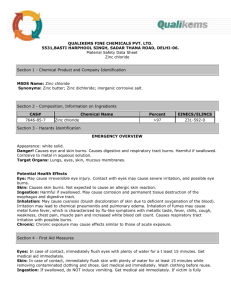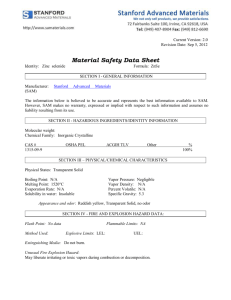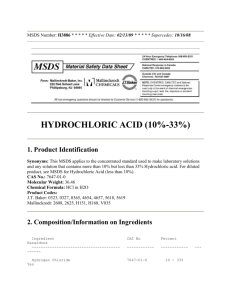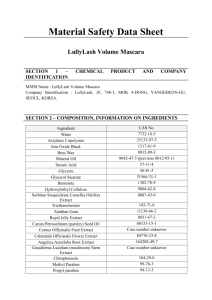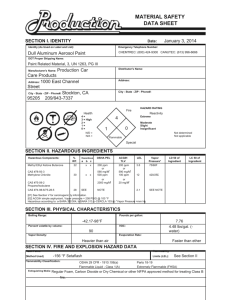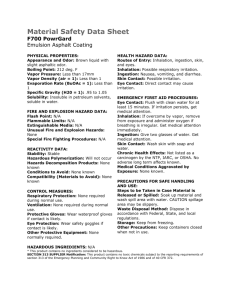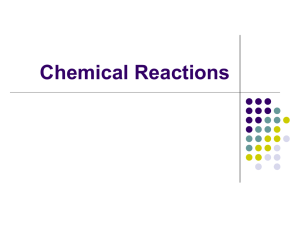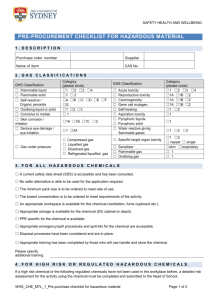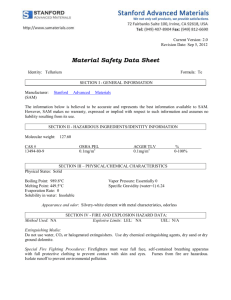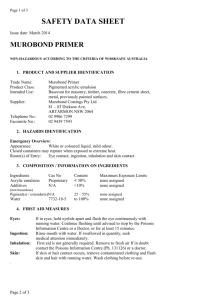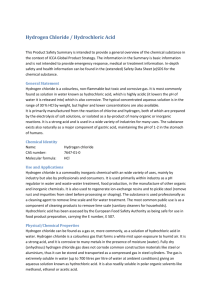GHS Classification
advertisement
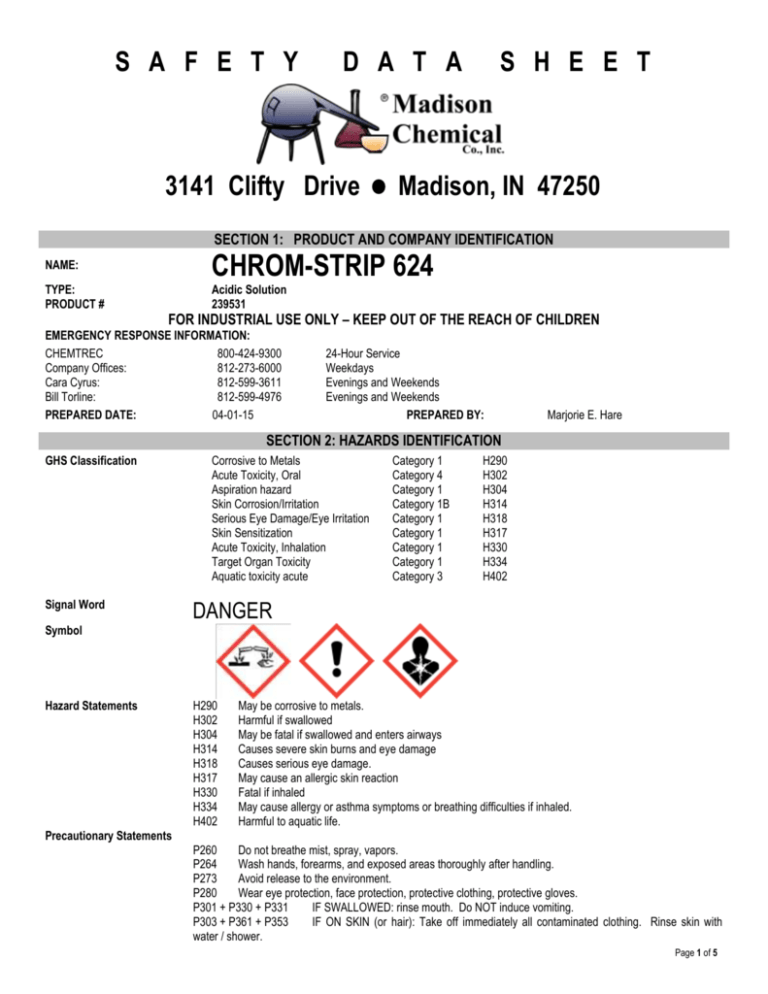
S A F E T Y D A T A 3141 Clifty Drive S H E E T Madison, IN 47250 SECTION 1: PRODUCT AND COMPANY IDENTIFICATION CHROM-STRIP 624 NAME: TYPE: PRODUCT # Acidic Solution 239531 FOR INDUSTRIAL USE ONLY – KEEP OUT OF THE REACH OF CHILDREN EMERGENCY RESPONSE INFORMATION: CHEMTREC 800-424-9300 Company Offices: 812-273-6000 Cara Cyrus: 812-599-3611 Bill Torline: 812-599-4976 PREPARED DATE: 04-01-15 24-Hour Service Weekdays Evenings and Weekends Evenings and Weekends PREPARED BY: Marjorie E. Hare SECTION 2: HAZARDS IDENTIFICATION GHS Classification Signal Word Corrosive to Metals Acute Toxicity, Oral Aspiration hazard Skin Corrosion/Irritation Serious Eye Damage/Eye Irritation Skin Sensitization Acute Toxicity, Inhalation Target Organ Toxicity Aquatic toxicity acute Category 1 Category 4 Category 1 Category 1B Category 1 Category 1 Category 1 Category 1 Category 3 H290 H302 H304 H314 H318 H317 H330 H334 H402 DANGER Symbol Hazard Statements H290 H302 H304 H314 H318 H317 H330 H334 H402 May be corrosive to metals. Harmful if swallowed May be fatal if swallowed and enters airways Causes severe skin burns and eye damage Causes serious eye damage. May cause an allergic skin reaction Fatal if inhaled May cause allergy or asthma symptoms or breathing difficulties if inhaled. Harmful to aquatic life. Precautionary Statements P260 Do not breathe mist, spray, vapors. P264 Wash hands, forearms, and exposed areas thoroughly after handling. P273 Avoid release to the environment. P280 Wear eye protection, face protection, protective clothing, protective gloves. P301 + P330 + P331 IF SWALLOWED: rinse mouth. Do NOT induce vomiting. P303 + P361 + P353 IF ON SKIN (or hair): Take off immediately all contaminated clothing. Rinse skin with water / shower. Page 1 of 5 SAFETY DATA SHEET Precautionary Statements continued P304 + P340 IF INHALED: Remove person to fresh air and keep at rest in a position comfortable for breathing. P305 + P351 + P338 IF IN EYES: Rinse cautiously with water for several minutes. Remove contact lenses, if present and easy to do. Continue rinsing. P310 Immediately call a POISON CENTER or doctor / physician. P321 Specific treatment (see Section 4). P363 Wash contaminated clothing before reuse. P405 Store locked up. P501 Dispose of contents / container according to local, regional, national and international regulations. SECTION 3: COMPOSITION / INFORMATION ON INGREDIENTS COMPONENT Hydrochloric acid Zinc chloride SYNONYM Muriatic acid None CAS NO. 7647-01-0 7646-85-7 % BY WEIGHT 70 – 80 1 – 10 SECTION 4: FIRST AID MEASURES DESCRIPTION OF FIRST AID MEASURES: EYES: Immediately flush with large quantities of cool water continuously for at least 15 minutes. Call a physician. SKIN: Immediately flush with large quantities of cool water continuously for at least 15 minutes. Call a physician. Remove contaminated clothing and shoes. Do not put contaminated clothing and shoes back on. Wash clothing and shoes thoroughly in soap and water; rinse repeatedly in clean water and dry before reuse. INGESTION: Do NOT induce vomiting. Give water. Never give anything by mouth if the person is unconscious or if having convulsions. Call a physician. INHALATION: Remove subject to fresh air and get medical attention. PRIMARY ROUTE(S) OF ENTRY: Eyes, skin, inhalation. MOST IMPORTANT SYMPTOMS / EFFECTS, ACUTE AND DELAYED: GENERAL: Causes burns to skin and eyes. EYE CONTACT: Causes serious eye damage. SKIN CONTACT: Causes burns. INGESTION: Harmful if swallowed. INHALATION: Can cause damage to nasal and respiratory passages. CHRONIC SYMPTOMS: None expected under normal conditions of use. INDICATION OF ANY IMMEDIATE MEDICAL ATTENTION AND SPECIAL TREATMENT NEEDED, IF NECESSARY: If you experience any of the symptoms / effects listed above seek medical advice. SECTION 5: FIRE FIGHTING MEASURES EXTINGUISHING MEDIA: Use extinguishing media as appropriate for surrounding fire. SPECIFIC HAZARDS ARISING FROM THE SUBSTANCE OR MIXTURE: Product is not explosive, however this product reacts with most metals to release hydrogen gas which can form explosive mixtures with air. Hazardous reactions will not occur under normal conditions. ADVICE FOR FIRE FIGHTERS: Wear self-contained breathing apparatus with full face piece operated in positive pressure mode and full body protective clothing. Use water spray to keep containers cool. Hazardous Combustion Products: Hydrogen chloride, acid vapors. SECTION 6: ACCIDENTAL RELEASE MEASURES PERSONAL PRECAUTIONS, PROTECTIVE EQUIPMENT, AND EMERGENCY PROCEDURES: Avoid all contact with skin, eyes and clothing. Avoid breathing vapors. Wear impermeable gloves. Goggles and face shield necessary. Wear full protective acid resistant clothing. Use NIOSH / MSHA approved positive pressure self-contained breathing apparatus when any material is involved in a fire. METHODS AND MATERIALS FOR CONTAINMENT AND CLEANING UP: Contain liquid spills with sand and absorb on inert material. Dispose with solid waste. Ventilate area. Eliminate all ignition sources. See Waste Disposal Method. Do not discharge to sewers or waterways without proper treatment. Contact state and federal environment organizations if RQ is exceeded. Page 2 of 5 CHROME-STRIP 624 SAFETY DATA SHEET SECTION 7: HANDLING AND STORAGE PRECAUTIONS FOR SAFE HANDLING: CONDITIONS FOR SAFE STORAGE, INCLUDING INCOMPATIBILITIES: Wear proper safety equipment when handling this product. Handle in accordance with good industrial hygiene and safety procedures. Normal for acidic materials. Store away from alkalis. Keep container closed when not in use. Always add acids to water; never add water to acids. SECTION 8: EXPOSURE CONTROLS / PERSONAL PROTECTION EXPOSURE GUIDELINES: CHEMICAL IDENTITY CAS NO. OSHA PEL ACGIH TLV Hydrochloric acid 7647-01-0 N.E.* N.E.* Zinc chloride (as fume) 7646-85-7 1 mg / M3 1 mg / M3 *The hydrochloric acid contained in this product has as components 60% water and 15% maximum as hydrogen chloride. Hydrogen chloride, CAS #7647-01-0, has an OSHA PEL of 5 ppm – ceiling limit and an ACGIH TLV of 2 ppm – ceiling limit ENGINEERING CONTROLS: Local exhaust required. INDIVIDUAL PROTECTION MEASURES: Selection of personal protective equipment should be based upon the anticipated exposure and made in accordance with OSHA’s Personal Protective Equipment Standard found in 29 CFR 1910 Subpart I. The following information may be used to assist in PPE selection. RESPIRATORY PROTECTION: In absence of proper environmental control, use NIOSH / MSHA approved inorganic acid vapor respirator for mists where airborne exposure is excessive. SKIN PROTECTION: Impermeable type gloves. Rubber apron and rubber boots required. Other equipment as required to avoid contact EYE PROTECTION: Goggles and face shield necessary. GENERAL HYGIENE CONSIDERATIONS: Eyewash facility and emergency shower should be in close proximity. Always wash hands after handling any chemical. SECTION 9: PHYSICAL AND CHEMICAL PROPERTIES APPEARANCE: ODOR: ODOR THRESHOLD: pH (100%): MELTING POINT/FREEZING POINT INITIAL BOILING POINT AND BOILING RANGE FLASH POINT (METHOD USED) EVAPORATION RATE FLAMMABILITY (SOLID, GAS) UPPER/LOWER FLAMMABLE OR EXPLOSIVE LIMIT VAPOR PRESSURE VAPOR DENSITY SPECIFIC GRAVITY SOLUBILITY IN WATER PARTITION COEFFICIENT: N-OCTANOL/WATER AUTO-IGNITION TEMPERATURE VISCOSITY, DYNAMIC DECOMPOSITION TEMPERATURE VISCOSITY Clear, straw-colored liquid. Pungent Not available. -0.5 – 0.0 Not available. 230°F (110°C). Not available. Not available. Not available. Not available. 28 mm Hg @ 20°F. 1.3 1.09 Complete. Not available. Not available. Not available. Not available. Not available. Page 3 of 5 CHROME-STRIP 624 SAFETY DATA SHEET SECTION 10: STABILITY AND REACTIVITY REACTIVITY: CHEMICAL STABILITY: POSSIBILITY OF HAZARDOUS REACTIONS: CONDITIONS TO AVOID: INCOMPATIBLE MATERIALS: HAZARDOUS DECOMPOSITION PRODUCTS: Hazardous reactions will not occur under normal conditions. Material is stable. Hazardous polymerization will not occur. No data found. Strong alkalis, alkali metals. Hydrogen chloride, acid vapors.. SECTION 11: TOXOLOGICAL INFORMATION ACUTE TOXICITY: LD50 AND LC50 DATA: ROUTES OF EXPOSURE / SYMPTOMS EYES: SKIN: INGESTION: INHALATION: GERM CELL MUTAGENICITY: TERATOGENICITY: CHRONIC EFFECTS / CARCINOGENICITY: SPECIFIC TARGET ORGAN TOXICITY (Repeated exposure): REPRODUCTIVE TOXICITY: SPECIFIC TARGET ORGAN TOXICITY (Single exposure): ASPIRATION HAZARD: COMPONENT INFORMATION: Hydrogen chloride Zinc chloride Not classified Not available. DANGER! Causes serious eye damage DANGER! Causes burns. WARNING! Harmful if swallowed. DANGER! Can cause damage to nasal and respiratory passages. Not classified. Not available. This material contains no ingredients above de minimus concentrations known or suspected to cause cancer. Not classified. Not classified. May cause allergy or asthma symptoms or breathing difficulties if inhaled. Not classified. LD50 Oral Rabbit 900 mg/kg LC50 inhalation rat: 4701 ppm/ 30 minutes Mutagenic effects: Inhalation: 100 ppm/ 24 hours (chromosome damage) Oral: 100 ppm (chromosome damage) Parental: 20 ppm (Cytogenic effects) LD50 Oral Rat: 350 mg/kg LD50 Dermal: No data. LC50 Inhalation: No data. SECTION 12: ECOLOGICAL INFORMATION ECOTOXICITY COMPONENT INFORMATION Hydrogen chloride Zinc chloride PERSISTENCE AND DEGRADABILITY: BIOACCUMULATIVE POTENTIAL: MOBILITY IN SOIL: OTHER ADVERSE EFFECTS: The ecotoxicity of this product is not known. Freshwater Fish Data: No data available. Invertebrate Toxicity Data: No data available LC50 Fish Carp (Cyprinus carpio): 0.4 – 2.2 mg/l/96 hr EC50 Water flea (Daphnia magna): 0.2 mg/l/48 hr Not available. Bioaccumulation potential is low Not available. Hydrochloric acid is listed as a hazardous air pollutant under the Clean Air Act. Page 4 of 5 CHROME-STRIP 624 SAFETY DATA SHEET SECTION 13: DISPOSAL CONSIDERATIONS Normal for acidic wastes containing zinc compounds. May require pH adjustment for neutralization. Dispose in accordance with local, state and federal regulations. WASTE DISPOSAL METHOD SECTION 14: TRANSPORTATION INFORMATION DOT PROPER SHIPPING NAME: HAZARD CLASS: IDENTIFICATION NUMBER: PACKING GROUP: EMERGENCY RESPONSE GUIDE: Corrosive, liquid, acidic, inorganic, n.o.s. (contains hydrochloric acid) 8 UN3264 II #154 SECTION 15: REGULATORY INFORMATION VOC: TSCA STATUS CERCLA REPORTABLE QUANTITY 0.1 pounds per gallon (6 grams per liter). All ingredients are listed on the TSCA inventory. 5,000 pounds for hydrochloric acid (approximately 1,143 gallons). 1,000 pounds for zinc chloride (approximately 10,976 gallons). x SARA 311 / 312 HAZARD CLASSES x ACUTE HEALTH FIRE SUDDEN RELEASE OF PRESSURE CHRONIC HEALTH REACTIVE SARA 312 INFORMATION Storage of 10,000 pounds or more may require filing a Tier 2 form. Threshold planning quantity for reporting is 10,000 pounds. This material is not an extremely hazardous substance (EHS). SARA 313 INFORMATION This material contains the following substances subject to the reporting requirements of Section 313 of the Superfund Amendments and Reauthorization Act of 1986 and 40 CFR Part 372 CHEMICAL NAME Hydrochloric acid* Zinc chloride (as zinc compounds) CATEGORY CODE None N982 CAS NUMBER 7647-01-0 7646-85-7 % BY WEIGHT 47 1 *Threshold determinations and release estimates for Hydrochloric acid apply only to aerosol forms, including mists, vapors, gas or fog, without regard to particulate size. STATE REGULATORY INFORMATION CALIFORNIA PROPOSITION 65 California has not identified the ingredients listed in Section 3 as known to cause cancer or reproductive toxicity. SECTION 16: OTHER INFORMATION MSDS STATUS: Revised to GHS Standards on 04-01-15. HEALTH FLAMMABILITY PHYSICAL HAZARD 3 0 0 FOR INDUSTRIAL USE ONLY – KEEP OUT OF THE REACH OF CHILDREN Page 5 of 5 CHROME-STRIP 624
